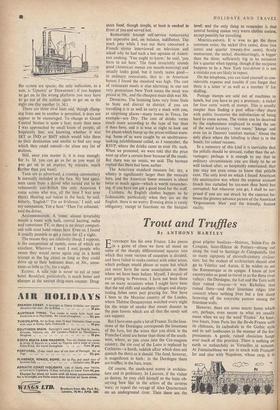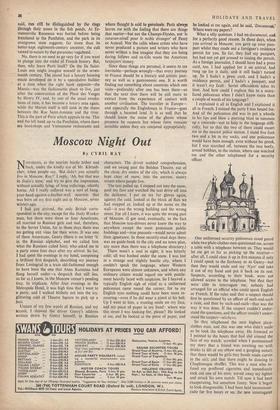Trout and Truffles
By ANTHONY HARTLEY EVERYBODY has his own France. Like pieces in a game of chess we have all stood on some of the sharply differentiated squares into which that most various of countries is divided; and have failed to make contact with other areas, which perhaps would please us more but which can never have the same associations as those where we have been before. Myself, I despair of ever getting to Provence. I have not been there on so many occasions when I might have been that the red cliffs and southern villages and sharp- tasting fishes seem past praying for. Nor have I been to the Mauriac country of the Landes, where Thdrese Desqueyroux watched every night for the wisps of smoke that meant disaster to the pine forests which are all that the sandy soil can support.
But I have seen quite a lot of France. To the lime- stone of the Dordogne corresponds the limestone of the Jura, but the wines that you drink in the Franche-Comtd are better than those of the south- west, where, as you cross into the Cro-magnon country, the yin rosé of the Loire is replaced by Corbieres—a harsh, reddish affair which does not quench the thirst as it should. The food, however, is magnificent in both : in the Dordogne there are truffles; in the Jura, trout.
Of course, the south-west scores in architec- ture and in prehistory. In Lascaux, if the visitor so desires, he may chill himself to the bone ob- serving how like us the artists of the caverns were; or repeat the voyage of Alan Quartermain on an underground river. Then there are the
great pilgrim basilicas—Moissac, Sainte-Foy de Conques, Saint-Hilaire de Poitiers—strung out along the road to Santiago de Compostella like so many signposts of eleventh-century civilisa- tion; but the student of architecture should also go to Vdzelay and Autun, if he wishes to see the Romanesque at its apogee. I know of feW countrysides as good to travel in as the three river valleys : the Dordogne, the Lot and the Tarn with their ruined donjons—it was Richelieu that ruined them—and their limestone ridges (the causses) where nothing lives but a few sheen browsing off the execrable pasture among the freestone walls.
However, there are areas nearer home which are, perhaps, even nearer to what we usually mean when we say the word `France.' An hour, two hours, from Paris lies the Ile-de-France with its châteaux, its cathedrals in the Gothic style and its soft landscapes in the manner of the Im- pressionists. A gentle, ruined classicism hangs over much of this province. There is nothing on earth as melancholy as Versailles in autumn. At Fontainebleau we are in touch with Francois Ier and also with Napoleon, whose carp, it 15 said, can siM be distinguished by the rings through their noses in the fish ponds. At Er- menonville Rousseau was buried before being translated to the Panthdon, and the park in its overgrown state suggests, far more than its better-kept eighteenth-century ancestor, the cult vowed to nature by that paranoiac vagabond.
No, there is no need to go very far if you want to plunge into the midst of French history. But, then, why leave Paris itself? On the Ile Saint- Louis one might imagine oneself in the seven- teenth century. The island had a luxury housing estate developed on it by a speculative builder
• at a time when the right bank opposite—the Marais—was the fashionable place to live, just after the construction of the Place des Vosges by Henry IV, and, by one of the usual revolu- tions of time, it has become a luxury area again, while the Marais itself is still sunk in the slums between the Rue Saint-Antoine and the river. This is the part of Paris which appeals to me. This and the left bank up to the Pantheon, where there are bookshops and Vietnamese restaurants and where thought is said to germinate. Paris always leaves me with the feeling that there are things that matter—but not the Champs-Elysees, not 'le caravan-serail pour le noble &ranger' of Passy or Auteuil. Nor the cards where artists who have never produced a picture and writers who have never written a line imagine that they are being daring fellows and ex-GIs waste the American taxpayers' money.
Since these things are personal, it seems to me inevitable—perhaps wrongly—that every journey to France should be a literary and artistic jour- ney as well as a gastronomic one. It is worth finding out something about countries which one visits—preferably after one has been there—so that the next time there will be still more to extract from the experience of contact with another civilisation. The traveller in Europe— and especially the Englishman in France—goes through a haunted land. It is as well that he should know the name of the ghosts whose presence he suspects but whose form remains invisible unless they are conjured appropriately.



































 Previous page
Previous page